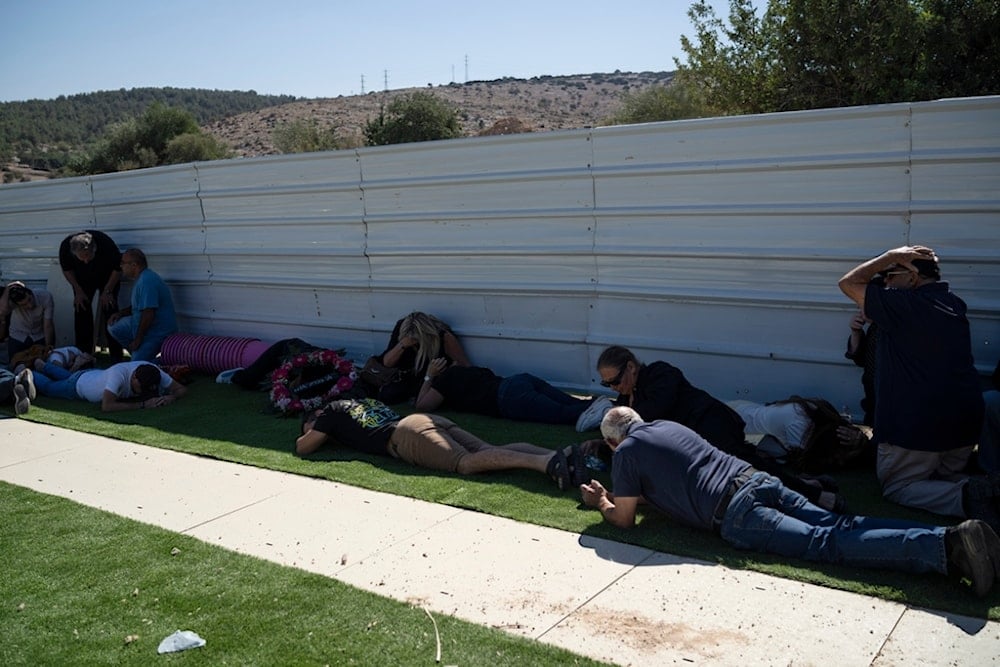Almost half of Israelis want a diplomatic solution with Hezbollah
Israeli settler society seems to be deeply divided over the war on Lebanon, as 46.5% advocate for a diplomatic resolution, while almost the same number support the continuation of battles.
-

People take cover as a siren warns of incoming rockets fired from Lebanon, at the Tel Regev cemetery in the outskirts of Haifa, northern occupied Palestine, Monday, Oct. 21, 2024. (AP)
Israeli public opinion seems to be sharply divided over the ongoing war on Lebanon, according to the Israel Democracy Institute’s October 2024 Israeli Voice Index.
The poll reveals that 46.5% of Israelis support seeking a diplomatic agreement with Hezbollah, while 46% believe "Israel" should continue fighting against the Resistance group to end the daily rocket attacks on northern occupied Palestine, which have displaced around 60,000 settlers.
Additionally, 7.5% of respondents expressed uncertainty about the best course of action.
54% of Jewish Israelis are pro-fighting on the northern front, whereas 38% have voted for a diplomatic solution that would end the war. Meanwhile, only 6.5% of Israeli Arabs support the continuation of the aggression on Lebanon, whereas a whopping 88% prefer establishing a diplomatic agreement instead.
The survey by IDI reveals that 62.5% of Jewish Israelis and 21% of Arab Israelis believe that the martyrdom of Hamas leader Yahya Sinwar brings "Israel" closer to allegedly achieving its "goal of dismantling Hamas."
Additionally, the poll shows that 43.5% of Israelis think that "Israel's" targeted strikes on Iranian military sites were insufficient in response to the large-scale ballistic missile attack from Tehran on October 1. Meanwhile, 41% of respondents believe the response was adequately strong, and only 3.5% feel it was too forceful.
IOF lost nearly two military divisions amid seven-front war
Political analyst Ben Caspit, writing for Maariv, stated that "Israel" has been engaged in a regional war on seven fronts for over a year, during which Israeli occupation forces lost nearly two divisions and are short of thousands of soldiers, even before accounting for the dead and wounded.
Amid this, the Israeli occupation government passed a law that would "perpetuate the exemption of a large and growing sector (Haredim), which does not serve in the Israeli military."
At the same time, the government is expanding regular service, significantly increasing the number of reserve days, raising the age for exemption from reserve duty, and eliminating existing exemptions.
These measures are causing exhaustion, frustration, and a heavy burden on the few who serve in reserves, while regular soldiers continue to suffer under the mounting pressure.
The report also highlighted the multiple crises "Israel" is facing domestically, politically, and economically, while continuing the regional war.
Ben Caspit questioned whether these actions will improve or worsen "Israel's" situation, concluding that "these actions make Israel's situation worse, meaning the Israeli government is acting against Israel during wartime."
He emphasized that this all occurred for one simple reason: "To maintain and expand Netanyahu’s control over Israel." He stated that "allowing him to continue implementing such actions, which cause permanent and strategic harm to Israel, sometimes irreversibly, will ultimately lead to a situation where Netanyahu, as Prime Minister, is doing the opposite of what his government stands for."
Additionally, Caspit referenced a recent survey by Channel 13, which asked if Netanyahu "is jeopardizing Israel’s security in light of the security scandals," 52% responded affirmatively, while only 7% disagreed.

 3 Min Read
3 Min Read








